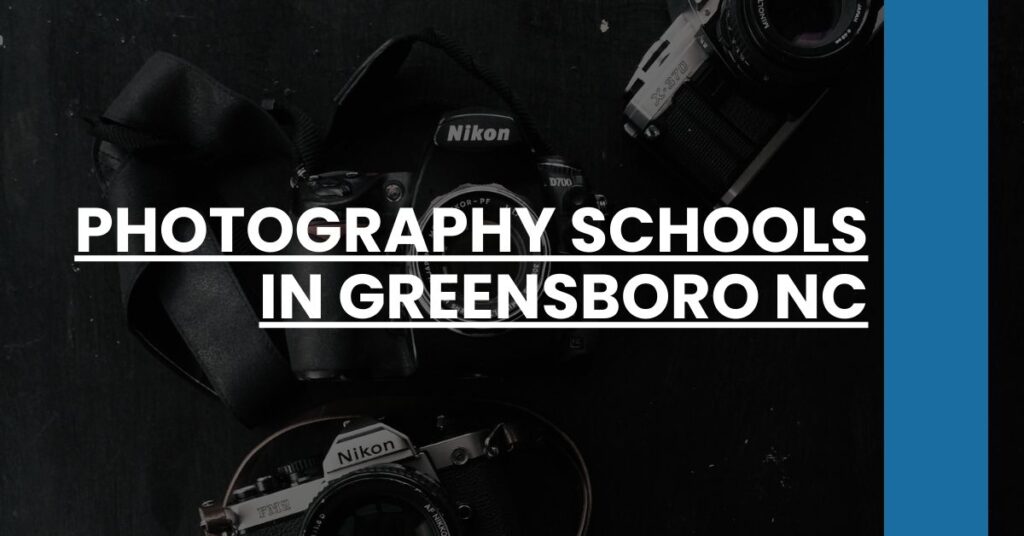Not in Greensboro? Check out our lists of Photography Schools in Cary, Charlotte, Concord, Durham, Fayetteville, High Point, Raleigh, Wilmington, Winston-Salem, and across North Carolina.
Are you passionate about photography and based in Greensboro, NC?
Searching for the best place to hone your skills?
This guide explores the top Photography Schools in Greensboro NC.
Learn what makes each school unique and find the one that fits your goals, all without the hassle of endless research.
Guilford Technical Community College – Photography Classes
Guilford Technical Community College (GTCC) offers a diverse array of photography classes designed to help you enhance your skills and knowledge, whether you’re a novice or a seasoned photographer. These courses are well-regarded for their affordability, making GTCC a popular choice among photography enthusiasts in Greensboro.
- Variety of Courses: GTCC offers classes that cover a wide range of topics, including basic camera mechanics, photographic composition, macro photography, portrait photography, retouching techniques, videography, and drone piloting.
- Hands-on Training: You benefit from practical training provided by experienced instructors who emphasize technical skills and creative exploration.
- Flexible Scheduling: GTCC provides flexible class schedules, which is convenient if you have other commitments such as work or family.
Note that GTCC’s photography classes fall under their Personal Enrichment program. This means they do not provide academic credit or certification upon completion. Nonetheless, they excel in providing a supportive and cost-effective environment tailored to hobbyists and serious photographers alike.
University of North Carolina at Greensboro – Photography Minor
The Photography Minor at the University of North Carolina at Greensboro (UNCG) is a robust program aimed at undergraduates who want to deepen their photography knowledge and skills. The minor is available to all undergraduates except those majoring in B.F.A. Studio Art, Art Education (K-12), or B.A. Studio Art and Art History.
The minor requires a minimum of 18 credit hours with a grade of C or above. Here’s what you can expect:
- Core Courses: Required courses include ART 140 Foundations in New Media and Design I, ART 285 Photography I, and ART 286 Digital Photography I.
- Art History Requirement: Choose one from ARH 110, ARH 111, ARH 112, or ART 100.
- Elective Options: Select two elective courses such as ART 384 Photojournalism and Documentary Photography, ART 344 Imaging I, ART 385 Photography II, ART 386 Studio Lighting for Photography, ART 387 Alternative Photographic Processes, ART 388 Photographic Interaction, ART 393 Practicum/Internship in Art Careers, and ART 487 Variable Topics in Photography.
This program combines foundational learning with practical experience, making it an excellent pathway for those considering a career in photography. The blend of theoretical knowledge and hands-on practice ensures you develop both technical proficiency and creative flair.
While precise tuition details and scheduling information aren’t provided online, prospective students are encouraged to contact the university for more specific information.
By considering programs like the Photography Minor at UNCG, you are well on your way to enhancing your expertise and preparing for a potential career in photography.
Tips for Choosing the Right Photography School in Greensboro NC
Choosing the right photography school in Greensboro requires careful consideration of several key factors.
Assess the Curriculum
First and foremost, evaluate the curriculum offered by each school. Ensure that the courses align with your specific interests and career aspirations. Look for schools that offer:
- Comprehensive Coverage: Basics to advanced techniques in photography, including both digital and film formats.
- Specialized Courses: In areas like portrait photography, videography, digital editing, and studio lighting.
- Practical Opportunities: Hands-on workshops, assignments, and projects.
Evaluate Faculty Credentials
The qualifications and experience of the instructors play a crucial role in your learning experience. Look for:
- Experienced Professionals: Trainers with substantial industry experience and a track record of success.
- Educational Background: Instructors with formal education in photography or related fields.
- Student Reviews: Testimonials and feedback from former students about their teaching effectiveness.
Consider Hands-on Learning Opportunities
Practical experience is invaluable in photography education. Choose a program that offers:
- Internships and Practicums: Opportunities for real-world experience in professional settings.
- Lab Work: Access to darkrooms and digital labs for hands-on experimentation.
- Field Trips and Workshops: Opportunities to practice skills in diverse environments.
Affordability and Financial Aid
Education costs can vary widely. Assess the overall affordability by considering:
- Tuition Fees: Compare the annual or per-course costs.
- Additional Costs: Materials, equipment, lab fees, and field trips.
- Financial Aid: Availability of scholarships, grants, or payment plans.
Class Scheduling Flexibility
If you juggle education with work or family responsibilities, scheduling flexibility is crucial. Check for:
- Evening and Weekend Classes: Availability of classes outside traditional hours.
- Online Options: Courses that can be taken remotely.
- Modular Scheduling: Programs that allow you to start at different times throughout the year.
Accreditation and Certification
While some programs are designed for personal enrichment and don’t offer academic credit, others provide recognized degrees or certifications. Consider:
- Accreditation: Ensure the school or program is accredited by legitimate educational bodies.
- Certification: Look for programs that offer certificates or diplomas upon completion, enhancing your professional qualifications.
Reputation and Reviews
Lastly, the school’s reputation can provide insights into its quality. Research:
- Student Testimonials: Reviews and experiences shared by past students.
- Industry Connections: The school’s relationships with photography studios, media companies, and other industry players.
- Networking Opportunities: Events, workshops, and alumni networks.
By weighing these factors, you can choose a photography school that best fits your needs and aspirations, leading you towards a fulfilling and successful career or hobby in photography.
Conclusion: Find Your Perfect Photography School in Greensboro
Finding the perfect photography school in Greensboro, NC, can dramatically influence your growth as a photographer. Whether you prioritize hands-on experience, comprehensive coursework, or flexible scheduling, Greensboro offers options like GTCC and UNCG to meet your needs. Choose wisely and take your first step towards a rewarding photographic journey today.

